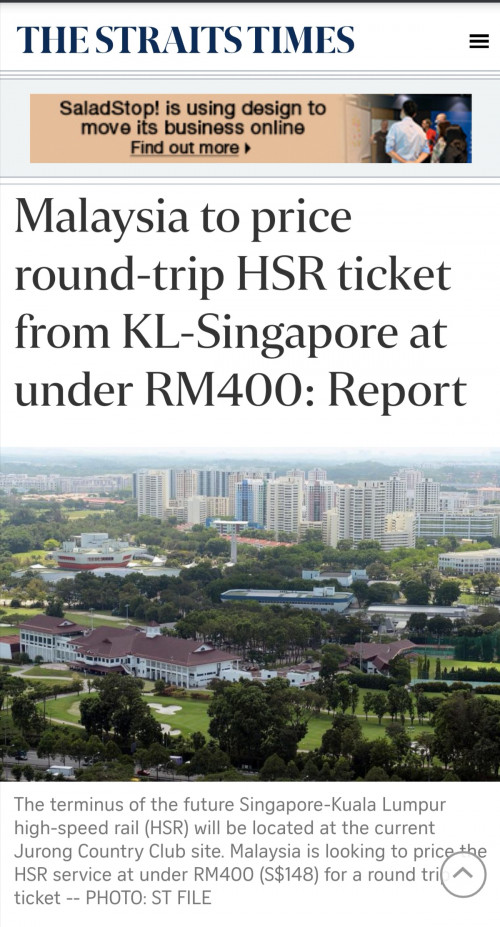- Joined
- Mar 31, 2020
- Messages
- 9,153
- Points
- 113
HSR without Singapore will be unsustainable, says Najib
www.freemalaysiatoday.com
 Najib Razak says a Kuala Lumpur-Johor Bahru HSR project may face huge losses for years.
Najib Razak says a Kuala Lumpur-Johor Bahru HSR project may face huge losses for years.
PETALING JAYA: Former prime minister Najib Razak has warned that Singapore’s exclusion from a high-speed rail line will make the project unsustainable.
This comes after Malaysia and Singapore announced that the final extension for the suspension of the bilateral agreement on the project had lapsed and that it is effectively cancelled.
In a Facebook post, Najib said according to media reports, the Kuala Lumpur-Singapore High Speed Rail (HSR) would be replaced by a Kuala Lumpur-Johor Bahru line using an electric train service (ETS) which was slower than the 350km per hour HSR.
“The cost of the new line is also reported to be between RM63 billion and RM65 billion, which is not that different from the original RM60 billion to RM68 billion for the original KL-Singapore HSR,” he said.
Without Singapore, Najib said, the number of passengers using the line is expected to drop from 8.4 million a year to just 4.2 million a year by 2031.
“This will have a huge impact on ticket prices – Singapore travellers can afford higher fares and (form a high) number of passengers – to the point this project will face huge losses for years.”
He said this means the government may, in the future, have to pay compensation every year or bail out the HSR operator.
Najib also said the slower speed of the ETS means the rail line can no longer compete with the aviation sector for the Kuala Lumpur-Singapore route, the busiest air route in the world.
He said Malaysia’s economy is expected to lose “trillions of ringgit” in benefits from the HSR project by 2050.
He also said that if the new line does not stop at the Bandar Malaysia project, as originally planned, it could affect the project’s development potential estimated at RM140 billion.
“But one benefit for the Malaysian government is that it can make all the procurement decisions and award contracts to anyone on its own compared to the joint venture model where all procurement and selection of vendors had to be made together and monitored by both countries (Singapore and Malaysia),” he said.
www.freemalaysiatoday.com

PETALING JAYA: Former prime minister Najib Razak has warned that Singapore’s exclusion from a high-speed rail line will make the project unsustainable.
This comes after Malaysia and Singapore announced that the final extension for the suspension of the bilateral agreement on the project had lapsed and that it is effectively cancelled.
In a Facebook post, Najib said according to media reports, the Kuala Lumpur-Singapore High Speed Rail (HSR) would be replaced by a Kuala Lumpur-Johor Bahru line using an electric train service (ETS) which was slower than the 350km per hour HSR.
“The cost of the new line is also reported to be between RM63 billion and RM65 billion, which is not that different from the original RM60 billion to RM68 billion for the original KL-Singapore HSR,” he said.
Without Singapore, Najib said, the number of passengers using the line is expected to drop from 8.4 million a year to just 4.2 million a year by 2031.
“This will have a huge impact on ticket prices – Singapore travellers can afford higher fares and (form a high) number of passengers – to the point this project will face huge losses for years.”
He said this means the government may, in the future, have to pay compensation every year or bail out the HSR operator.
Najib also said the slower speed of the ETS means the rail line can no longer compete with the aviation sector for the Kuala Lumpur-Singapore route, the busiest air route in the world.
He said Malaysia’s economy is expected to lose “trillions of ringgit” in benefits from the HSR project by 2050.
He also said that if the new line does not stop at the Bandar Malaysia project, as originally planned, it could affect the project’s development potential estimated at RM140 billion.
“But one benefit for the Malaysian government is that it can make all the procurement decisions and award contracts to anyone on its own compared to the joint venture model where all procurement and selection of vendors had to be made together and monitored by both countries (Singapore and Malaysia),” he said.








